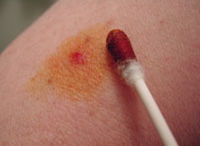
Photo from wikipedia
The activity of a hypochlorous acid‐producing electrochemical bandage (e‐bandage) in preventing methicillin‐resistant Staphylococcus aureus infection (MRSA) infection and removing biofilms formed by MRSA was assessed using a porcine explant biofilm… Click to show full abstract
The activity of a hypochlorous acid‐producing electrochemical bandage (e‐bandage) in preventing methicillin‐resistant Staphylococcus aureus infection (MRSA) infection and removing biofilms formed by MRSA was assessed using a porcine explant biofilm model. e‐Bandages inhibited S. aureus infection (p = 0.029) after 12 h (h) of exposure and reduced 3‐day biofilm viable cell counts after 6, 12, and 24 h exposures (p = 0.029). Needle‐type microelectrodes were used to assess HOCl concentrations in explant tissue as a result of e‐bandage treatment; toxicity associated with e‐bandage treatment was evaluated. HOCl concentrations in infected and uninfected explant tissue varied between 30 and 80 µM, decreasing with increasing distance from the e‐bandage. Eukaryotic cell viability was reduced by an average of 71% and 65% in fresh and day 3‐old explants, respectively, when compared to explants exposed to nonpolarized e‐bandages. HOCl e‐bandages are a promising technology that can be further developed as an antibiotic‐free treatment for wound biofilm infections.
Journal Title: Biotechnology and Bioengineering
Year Published: 2022
Link to full text (if available)
Share on Social Media: Sign Up to like & get
recommendations!